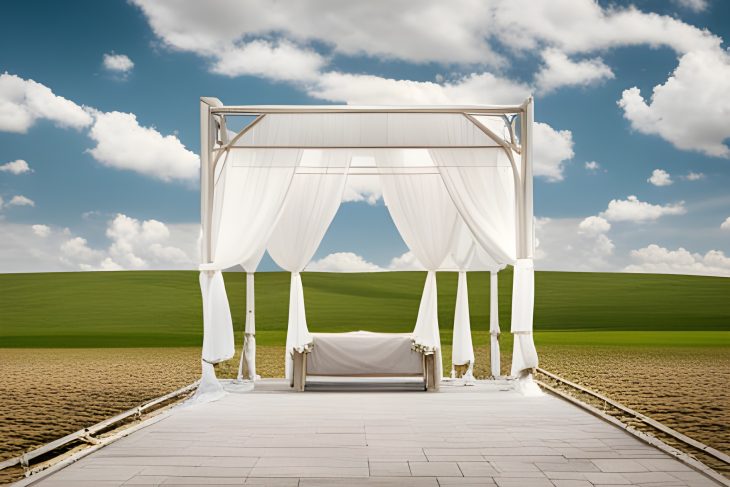Throughout Abraham’s life, his overwhelming concern for others had hobbled him. He yearned for apathy, if not outright contempt. Then, perhaps, he would be spared the weight of others’ burdens.
All through junior high school Abraham wore the neck brace so he wouldn’t have to see airplanes, but still he heard them. The roar of every engine delivered a new bundle of old anxiety: Who on the plane is heading to a funeral? Who was molested? Whom does disappointment await?
It entered his mind that if he said all their names, they would be OK.
“Aaron,” he said aloud, alone in his bedroom. “Abbe. Abbie. Abby. Abigail. Ace. Ada. Agatha. Alan. Allen. Amy. Anabelle. Ann. Anne. Annie. Annette. Anthony. Apelonia. Ashton. Avner…”
“Damn! I forgot ‘Antoinette.’ Umm, Adam. Did I say ‘Adam?’ ‘Amistad?’ ‘Arnold?’ ‘Ashley?’ ”
It would never do. Even if he could somehow say all of their names, he wouldn’t really be thinking of them. He could attach no face, no personality, no story. All he could do was worry.
It consumed him and managed to intensify.
In the 10th grade, he panicked upon finding a slip of paper in the pocket of a new pair of pants.
“Inspected by 114,” it said.
“One-fourteen?” he wondered. “Who is One-Fourteen? Is One-Fourteen a man or a woman? Where does One-Fourteen live? How old is One-Fourteen? Do people refer to One-Fourteen by name or by number?”
He imagined One-Fourteen reporting to work, a bleak place with buzzy fluorescent lights. It rained where One-Fourteen worked, always rained, and the concrete box where hundreds of numbers toiled was cold and leaky.
It was, Abraham decided, in another country with few labor laws. One-Fourteen lived in an apartment complex with hundreds of identical units. One-Fourteen woke, drank weak coffee and chewed bread before walking to the bus stop, where other numbers awaited.
“Good morning, One-Fourteen,” a colleague greeted cheerlessly. “Good morning, Seven Twenty-Four,” One-Fourteen responded.
They stared at their shoes, which had been inspected by their co-workers, Nine Fifty-Two and Eight Twenty-Five, respectively. One-Fourteen attempted levity.
“Back to the grind.”
“Yes,” Seven Twenty-Four agreed solemnly. “Back to the grind.”
The two boarded Bus 51, took the same seats they did every morning and arrived at work before the sun. They parted at the gate. Seven Twenty-Four headed to a work station between the officious Seven Twenty-Three and the arthritic Seven Twenty-Five; One-Fourteen took the spot between One-Thirteen, who was flatulent and One-Fifteen, who suffered from uncontrollable tremors.
One-Fourteen had been assigned to Inspection Facility No. 82 – it was called Inspection Facility No. 82 because of its proximity to Designated Waterway No. 82 – after graduating a high school of the same name.
Once, One-Fourteen had aspirations.
“An artist,” One-Fourteen thought. “I shall be an artist.”
One-Fourteen acquired a set of oil paints, and used all the gray to paint a landscape of home – Industrial Village No. 82, so named because of its location next to Designated Bridge No. 82.
And then One-Fourteen, who then was called Pupil Ninth Year Third Row W Column, dabbed on some yellow, where the sun might be.
The Deputy Subdirector for Cultural Propriety frowned when he saw the painting that accompanied Ninth Year Third Row W Column’s application. He summonsed the child to the Cultural Guidance Center.
Ninth Year Third Row W Column was young, and did not know better than to be excited. A trip to the Cultural Guidance Center, which was considered ornate because it was surrounded by a fence and had an awning at the entrance, could only be good. Most likely, Ninth Year Third Row W Column would be commended for devotion to Industrial Village No. 82. A commendation could mean permission to leave the village and study at Regional Center for Authorized Artistic Expression, a division of Cultural Propriety.
The youngster stood rigidly in the waiting area, daydreaming about authorized artistic expression. After three hours, a door opened.
Ninth Year Third Row W Column gasped at the opulence of the deputy subdirector’s office: The beige linoleum floor gleamed, and three grayscapes adorned the walls. The deputy subdirector’s desk appeared to be genuine steel, and a bookshelf contained five volumes.
The deputy subdirector waved Ninth Year Third Row W Column in. A gray metal chair occupied space in front of the desk, and the deputy subdirector pointed at it.
“Shall I sit there?” Ninth Year Third Row W Column asked.
“No need,” the deputy subdirector answered. “You may stand.”
The deputy subdirector held Ninth Year Third Row W Column’s painting in a wax paper envelope and peered at it through half-moon spectacles.
“Yours?” he asked.
“Yes,” Ninth Year Third Row W Column answered proudly.
The deputy subdirector removed the painting from the envelope and pointed at the yellow.
“What is the meaning of this splotch?”
“Sir?”
“This bit of…” The deputy subdirector flipped through pages in a book on his desk, occasionally holding the painting to it. “Yellow,” he said finally.
“It’s the sun.”
The deputy subdirector blanched. “The sun is gray.”
“Well, through the smoke it looks gray, but it’s…”
The deputy subdirector interrupted.
“What smoke?”
“From the smokestack.”
The deputy subdirector drew in a breath.
“We do not have smokestacks,” he said genially. “We have ventilation systems which enrich our sky with evidence of work. The sun is gray and it is lower in the sky than the object you depict.”
Ninth Year Third Row W Column was seized with a horrible feeling: The deputy subdirector judged the painting harshly. Hope for a life in the arts began to drain away.
“I see your point,” Ninth Year Third Row W column said, an attempt to appease the deputy subdirector and salvage any dream of painting again. “I was using artistic license.”
The deputy subdirector squinted.
“You would benefit by additional training,” he said.
For a moment, Ninth Year Third Row W Column thought that might mean art school.
“We expect an opening at IF-82. It will teach you a proper appreciation for fine detail, which you will find beneficial. I will recommend you for trousers.”
After high school, Ninth Year Third Row W Column, who by then was known as Twelfth Year Final Row Z Column – “Final Z” to classmates – was issued a box of paper slips marked “Inspected by 114” and sent to work finding flaws in pants.
Abraham grieved for One-Fourteen. He wondered whether the inspector kept the oil colors, and whether One-Fourteen ever added a dash of yellow to inspection slips.
Abraham felt guilty for imagining such a grim life for One-Fourteen, and wished he had thought up a happy existence, instead. He tried to picture One-Fourteen and family after their Thanksgiving meal, wearing perfectly assembled, splendidly comfortable pants, and playing Scrabble in front of the stone fireplace in their cottage in Maine.
“As if,” Abraham muttered.
THOUGHTS OF ONE-FOURTEEN haunted Abraham that year and into the next, nearly causing him to fail World History: Instead of paying attention to Mr. Baxter’s lectures, Abraham stared at the enormous map on the wall, wondering which country was One-Fourteen’s.
Abraham disliked maps. He fretted that while they displayed the names of countries and showed the lines that separated them, they ignored the millions of people who lived in them. He wondered who chose to make Canada blue and Cambodia green, and whether the Canadians and Cambodians were aware that they and their families had been reduced to washed-out colors on a wall map in a suburban school. Every day, Abraham chose another part of another country on the map and stared of it, thinking about the people who lived there. Nearly a half-million people lived in Helsinki, in southern Finland, and a terrible thought rumbled into Abraham’s skull.
“I’ll never be able to think of them all.”
He felt the need to blink, but was afraid to close his eyes – afraid that if he broke his gaze on the map, all the people in all the countries would be left alone, like Mrs. Lubow. He battled the instinct to clamp his eyes shut, even as they grew parched. The vent above his desk directed a torrent of warm air to his face, and when willpower began to fail, he held his eyes open with his fingers.
“If I don’t think about them, who will?”
Sadness cascaded through his body and tears hydrated his arid eyes.
He was still weeping when the class ended, when the day ended, when the week ended. All that month he wept, and intermittently throughout the next. He shed tears for billions of people he never would know, for faces he never would glimpse, for voices he never would hear. He wept for celebrations he’d never enjoy and heartbreaks he’d never mourn.
Fucking map.
Abraham devised a plan.
That Friday afternoon, he drove to an enormous building on Grand Highway.
“Welcome to Houseport Junction Superstore,” a woman inside greeted him.
“Thanks,” Abraham answered, looking at her Houseport Junction Superstore badge. “Blanche.”
Customers seldom acknowledged Blanche, and she was pleasantly surprised by the young man’s consideration.
Abraham glanced around the cavernous store, overwhelmed by the magnitude. Blanche had seen the look before.
“First time here?” she asked.
“Yeah.”
“Can I help you find something?”
“Please,” Abraham answered. “Paint.”
“OK,” Blanche said. “Paint. You wanna go right here and left to Aisle Three, past keys, locks and doors. When you get to Plumbing Pavilion – you’ll see the commodes – the aisles fork. Stay to the left, near the two-by-fours. If you get to sheetrock, you’ve gone too far, and you’ll want to turn back. You’ll see a big green arch that says ‘Gardens Gardens,’ and you’ll veer to the right there. Go right before the arch but after the Leaning Tower of Piping. Once you do that, you should see a sign for Aisle 97. At that sign, pass medium appliances and you’ll be at Paint. Ahh, do you want interior or exterior?
Abraham looked confused, and Blanche removed a card from her yellow-and-black Houseport Junction Superstore smock.
“It’s simpler than it sounds,” she said.
Blanche was missing her right thumb and the first inch of her index and middle fingers, and she struggled to unfold the card. Finally, she succeeded, and handed it to Abraham, who shuddered.
The card, he realized, was a map of the store. He recoiled and instantly felt guilty, afraid Blanche would mistake his horror at the sight of a map for shock at her mangled hand.
“It’s OK,” Blanche said, not unkindly.
She meant it.
“I can still buy potato chips.”
“Excuse me?” Abraham asked.
“I always liked potato chips.”
Abraham once liked them, too.
When he was a little boy, his parents used to order large tins of Charles Chips potato chips. A plump, red-faced man who Abraham assumed was Charles, delivered the cans to Abraham’s house every week.
Sometimes, he delivered pretzels, too.
When Abraham was nearly 7, he and his mother were at Garnish!, a popular and well-stocked grocery store on Grand Highway. After picking up a jar of macadamia nuts, his mother stopped at an unfamiliar shelf and examined a bag of potato chips.
“What are you doing?” Abraham asked, startled.
“I’m…”
Abraham interrupted.
“I know what you’re doing,” he corrected. “Why?”
“So we can have chips,” his mother answered.
“We don’t buy chips,” Abraham insisted. “And they don’t come in bags. Charles brings them to my house in big giant cans.”
“We buy them here now, honey,” his mother said. “And the man who delivers them isn’t Charles.”
Abraham felt queasy.
“Then who is he? And why does he bring me chips?”
Abraham’s mother said she didn’t know who the man was.
“You let a strange man bring chips to my house?” Abraham demanded.
“That’s his job,” Abraham’s mother said. “Like the mailman.”
Abraham lost his equilibrium.
“You don’t know the mailman?” He raised his voice and asked a terrified, urgent question: “Why do these people come to my house?”
Abraham wondered about all the other people who visited his house: the exterminator, the telephone man, the cable guy. Thomas, who mowed the lawn, and Esteban, who fixed stuff. He began to cry.
“It’s their job, honey,” Abraham’s mother said. “The mailman works at the post office and the potato chip man works at the potato chip factory.”
“Then why are you buying chips here?” Abraham asked.
“The company stopped delivering,” his mother answered.
“Why?” Abraham asked.
“People started buying them here, instead. It’s like when the milkman stopped delivering milk.”
“When the what?”
“The milkman,” his mother answered. “We used to have a man bring milk right to the house, but people started buying their milk at the store, instead, so he stopped coming.”
“We had a milkman?” Abraham sobbed. “When?”
“A long time ago,” his mother said.
“Did Charles and the milkman know each other?”
“I don’t know. And the chip man is not Charles.”
“Then who is he? And what’s going to happen to him? And who was the milkman? And what happened to him? And why don’t you know their names?”
His mother could not answer the questions, and Abraham stopped eating potato chips.
ABRAHAM COULD NOT REMEMBER what a potato chip tasted like, and he wondered, holding the card Blanche had handed him, what chips and maps had in common.
Blanche sensed his confusion, although she remained under the misimpression he was disturbed by her hand.
“After the accident, I was so worried about what I couldn’t do,” Blanche told Abraham. “One night in the hospital I couldn’t sleep, so I walked down to the cafeteria. It was closed, and I stood there staring at bags of potato chips in vending machines. My hand was all bandaged up, and for the life of me, I didn’t know how I’d ever be able to put change in one of those machines. Oh, I was so upset, I started to…”
A man wearing a tie and a Houseport Junction Superstore smock started toward them, glaring, and Blanche’s demeanor changed.
“Say paint,” Blanche whispered urgently.
“Paint?” Abraham answered.
The man forced a weak smile through his scowl. Donald Felcramp, the assistant regional manager, was jittery because of an upcoming store visit by his boss’s boss’s boss, the district vice president. If Felcramp was on edge, all of Houseport Junction was on edge.
“Paint is up near the Leaning Tower of Piping,” he said. “Take you maybe three minutes to walk there. You looking for interior or exterior?”
“It’s going inside, so I guess ‘interior?'” Abraham said.
“Too bad,” Felcramp said. “Dry weather is good for exterior.”
Felcramp looked at Blanche.
“How long have you been with the company?”
“Six years,” Blanche said.
“Since the start?”
“Yes,” Blanche answered. “You hired me.”
“Lot of hires since then,” Felcramp answered. “What’s your hire number?”
“Well, it’s this store number, plus the year we opened and a dash and two As and three zeroes and a four.”
“You were the fourth hire here?”
“Yes,” Blanche said, sighing.
“Didn’t recognize you,” Felcramp said, shrugging. “Good to see you again though. You should use your number more.”
He turned to Abraham.
“Sorry ‘bout that. Let me take you to paint. I used to work in paint. Still on top of it. Interior, right?”
Abraham looked sadly toward Blanche as Felcramp led him deep into the store.
Blanche called the paint supervisor to warn him that the assistant regional manager was on his way, and the paint supervisor rushed toward Felcramp as he and Abraham approached.
Following Houseport Junction Superstore protocol, the paint supervisor acknowledged the customer before the boss.
“Something tells me you’re looking for paint,” he said, nervous at Felcramp’s presence.
“Could it be that he’s in the paint department?” Felcramp snorted. “I’ll provide excellent service on this sale myself.” He shooed the paint supervisor away.
“Interior,” he announced to Abraham. “What color?”
“Well I’d like white,” Abraham said.
“Which white?”
“What?”
“Which white?” Felcramp asked. “We have the largest paint selection in the state. What type of white are you looking for?”
Abraham was perplexed.
“Well, just…white,” he said.
Felcramp already regretted walking the kid back to paint.
“OK,” Felcramp said. “You want a glossy or a matte finish? A bright white or a cool white? Oyster Shell White or Clamshell White? We got Eggshell White, Snowy White, White-As-Snow, Executive Mansion White, Bright White, Pearl White, Tusk White, Pearly White, Purely White, Bone White, Linen White, White Sand Beaches White, Icy White, Frosty White, Salt Islands White, Bridal White. We have Lace, Baby Powder, Hollywood Smile – which comes in a nice glossy finish. We got Ivory, we got Cotton, we got Cloud. We got your birds – White Dove, Snowy Egret, White Heron, White Ibis. Your foods – Vanilla Frosting, Vanilla Vanilla, Sugar White, Marshmallow. We got your flowers – White Rose, Calla Lilly, White Freesia, White Lisianthus, which is lovely. And of course the creams – French Cream, Dutch Cream, Belgian Cream, German Cream, English Cream, Irish Cream.”
“No countries,” Abraham said.
“No problem,” Felcramp said. “Let me show you some samples. You see, your Arctic Sunshine has a hint of blue to it, while your Gleaming White has a little yellow. Painted my daughter’s cradle ‘Gleaming White.’ It’s a nice choice. Think about it.”
“You got anything like Liquid Paper?” Abraham asked.
“Like what?” Felcramp replied.
“Liquid Paper,” Abraham answered. “You know, like, correction fluid.”
“What a horrible color,” Felcramp thought. “What a weird kid.”
But he said:
“I could make it.”
Felcramp liked the challenge. Houseport Junction Superstore carried correction fluid, and Felcramp acquired a bottle and spent the next hour mixing until he was satisfied that he had reproduced correction fluid. He mixed an extra half-gallon for the district vice president, who he knew would be impressed with his devotion to customer care.
Abraham was impressed, as well.
“Tell me something,” he asked Felcramp. “How do you know all those shades of white?
“Well,” Felcramp said, “It’s my job to know what’s important.”
“Oh,” Abraham said. “How come you didn’t know Blanche’s name?”
Felcramp blinked and Abraham walked off, past the Leaning Tower of Piping, past the two-by-fours, past aisles of what Felcramp thought was important.
He looked for Blanche on the way out, but he couldn’t find her.
On the way home, he stopped at Garnish! for a bag of potato chips. It was delicious.
The next day, Abraham put the can of what he decided to call “Blanche White” paint in a Garnish! shopping bag and carried it to school. The Debate Team was practicing in the Coca Cola Language Arts Wing, one hall away from the Garnish! Social Studies Wing, where Mr. Baxter’s classroom was.
Abraham, who was the Debate Team’s official timer, faked a stomachache, handed his stopwatch to the debate coach, and headed down the hall.
The walls in Mr. Baxter’s room – and the entire school – were a color Abraham could not place. He tried to categorize it, but it was so insipid, Abraham had no idea what it was. “Is it yellow?” Abraham wondered. “Blue? Brown? Some kind of green? Or is it a dumpy shade of red. In the light it might be purple, but…no. It’s definitely not purple.”
In fact, the room had been painted an institutional shade of something that did not qualify as color. Felcramp could have told him the shade was custom-designed for blandness and was called “YourCare,” for the company that had commissioned it.
Abraham dipped a brush in the paint and wrote “114” in large, Blanche White numerals, over much of Africa, Asia, Europe and the Middle East. Over North America, he wrote, “Mrs. Lubow.”
Then he covered it all.
Abraham felt a temporary twinge of regret painting over Mr. Baxter’s giant map, sad that he was blotting out all the lives it represented. But then he realized how poorly it represented them, and he felt good.






